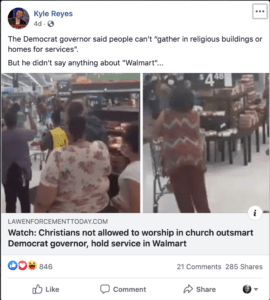Today a friend posted a photo of a church that went to worship in an open Walmart since church buildings were closed in their town due to the pandemic. In the photo, worshipers were seen standing rather close together and seemed to be taking up a lot of space.

Laura Rector
I can only judge from one photo, but this put a lot of people in an indoor space who didn’t need to be there. And it disrupted those who were at Walmart for essential tasks. Plus, it inconsiderately extended the indoor, public time of those there for other reasons — putting them more at risk than they bargained for that day since they had to navigate more people.
I know these well-meaning people only wanted to show their love for God. And, sadly, this isn’t the worst form of churches insisting on gathering. But this pandemic has shown us there are other creative options for Christian worship that don’t risk harming others.
In the Bible, fasting is a form of worship, and I don’t think it’s a stretch to apply the principles of Isaiah about fasting to the sacrifices Christians are being called to make now. Isaiah 58 says, “Yet on the day of your fasting, you do as you please and exploit all your workers. Your fasting ends in quarreling and strife, and in striking each other with wicked fists. You cannot fast as you do today and expect your voice to be heard on high.”
Worship that has the potential to hurt others isn’t what God wants. Spreading germs seems like a form of violence these days, as sure as hitting someone with a fist. Worship that makes work harder for essential employees and adds to their exploitation isn’t worship.
Instead, Isaiah 58 also tells us about another kind of fasting that protects others and promises, “If you do away with the yoke of oppression, with the pointing finger and malicious talk, and if you spend yourselves in behalf of the hungry and satisfy the needs of the oppressed, then your light will rise in the darkness, and your night will become like the noonday.” Our sacrifice must protect others, not risk lives.
“Has the church suddenly gone from being pro-life to being pro-let’s-spread-disease-and-kill-people?”
The Bible also teaches in 1 Corinthians 10: “‘I have the right to do anything,’ you say — but not everything is beneficial. ‘I have the right to do anything’ — but not everything is constructive. No one should seek their own good, but the good of others.” And in Philippians 2, the Bible says, “Do not merely look out for your own personal interests, but also for the interests of others.”
Religion is a protected human right, but it shouldn’t violate others’ rights to things like food or safety. Has the church suddenly gone from being pro-life to being pro-let’s-spread-disease-and-kill-people?
 Singing in a public place is not being the church if it hurts people. Wearing masks, washing hands frequently and social distancing, temporarily stopping gatherings, supporting health care workers, feeding the hungry, finding ways to be present to scared people without putting them at risk — these are what’s important right now, not fretting about where or when the church can meet.
Singing in a public place is not being the church if it hurts people. Wearing masks, washing hands frequently and social distancing, temporarily stopping gatherings, supporting health care workers, feeding the hungry, finding ways to be present to scared people without putting them at risk — these are what’s important right now, not fretting about where or when the church can meet.
Theologically speaking, we can and are the church no matter what happens in a building. If people do risk their lives, it should be for something that is life-giving like saving Black and brown lives in America or protecting real democratic rights in Hong Kong, not something that’s really just all about “us” and not getting what we want if it can hurt people.
Asking, “Why can Walmart or restaurants be open and churches can’t?” or “Why can there be protests but not church?” is to ask the wrong questions. Rather, Christians should be the first people asking, “How can we sacrifice to protect the lives of others whom we teach God loves?” That’s what being the church should look like during this pandemic.
“Christians should be the first people asking, ‘How can we sacrifice to protect the lives of others whom we teach God loves?'”
Christians, let’s do something to make the world actually better when so many people are very sick or dying and let’s quit doing risky things that will just make the pandemic last longer and be harder on everyone — even if it means finding new, safe ways to worship. Quit making the pandemic worse for others, so that families don’t have to choose between kids being home hungry, possibly unsupervised, and lonely or getting the disease at school and spreading it to parents and grandparents.
Do something safe to cheer up a lonely kid crying for her friends even if you have to figure out how to play Candyland over Zoom. Call a senior adult. Help a neighbor who lost a job. Show up with numbers at city council Zoom sessions to protect people from eviction. Vote for a political candidate who will help us in crisis instead of making it worse.
It hurts me not to be able to worship with others, but it also hurts to think of people dying for my choices. Jesus coupled the commands to love God and love my neighbor together, and he followed this with the parable of the Good Samaritan. Churches are sad, scared and angry, too, about COVID disrupting their way of life — just like most of the world — but we need to quit acting like the robbers in the story of the Good Samaritan who inflicted pain on others and instead be the person who is helping even if no one else will. We should be known for the good we are doing, not for making a very bad situation worse.
Laura Rector serves as affiliate assistant professor of Christian ethics at Fuller Theological Seminary and adjunct instructor for Mercer University. She holds a Ph.D. in theology and teaches Christian ethics.


